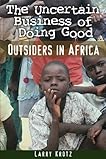 The Uncertain Business of Doing Good: Outsiders in Africa by Larry Krotz
The Uncertain Business of Doing Good: Outsiders in Africa by Larry KrotzMy review
rating: 4 of 5 stars
Total impulse buy of a book that apparently nobody else has read. University of Manitoba Press probably doesn't have a bit marketing arm.
Krotz recounts various stories from his experiences working in Angola, Tanzania, and Kenya. I know woefully little about Angola, so Krotz has at least given me a frame of reference for learning more. His take on the UN prosecution of a few Rwandans after the genocide was enlightening and matched up perfectly with the interpretation I have come to get from my Congolese friends. The genocide was obviously a horrific period in that country's history and in the history of global inaction, but to say that the Hutus simply slaughtered innocent Tutsi's is a gross simplification of the back and forth, civil war like dimension of that conflict. Krotz came to believe that the UN went into the tribunal with the verdict already determined, and the one judge who really wanted to get the story straight was removed from the 3 judge panel. So much for outsiders doing good. The account of how the tribunal brought money but also problems to the small Tanzanian city is also enlightening.
About half the book covers HIV research in Africa, and what a rush of scientific inquiry happened on the continent when research dollars became available. At one point, a group of scientists in South Africa abandoned their research because they came to believe that circumcision was so successful in preventing the acquisition of the virus that they could no longer ethically maintain a control group of uncircumcised men. Another team of researchers thought it was unethical to abandon their research until the study was completed. Related issues of IRB interference will be of interest to all academics who wrestle with IRB boards.
Not riveting or heart-wrenching stories, but that is more than okay--insightful, thoughtful, outsider perspective.
View all my reviews.